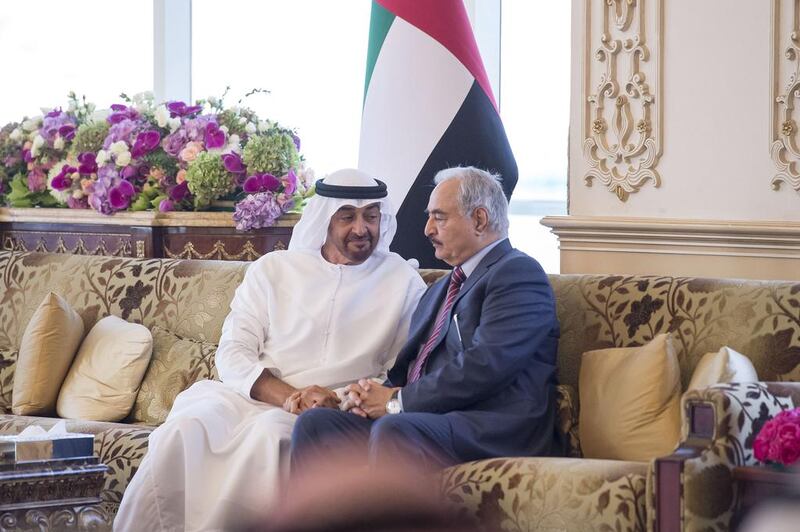Abu Dhabi // The prime minister of Libya’s UN-backed government and the country’s most powerful military commander met in Abu Dhabi on Tuesday for direct talks on ending Libya’s conflict.
The meeting came after months of international pressure and a failed attempt at negotiations in Cairo in February.
The rival figures met face to face “thanks to international and Arab mediation”, according to Libya’s Lana news agency. It was the first time they had met since early 2016.
Egyptian president Abdel Fattah El Sisi was scheduled to arrive in Abu Dhabi on Wednesday, but it was unclear whether he would attend the talks.
The UAE and Egypt have led the mediation efforts between the two sides, with both men making separate trips to Abu Dhabi over the past six months. In February, they were set to meet in Cairo to discuss compromise amendments to the Libya Political Agreement of 2015. Brokered by the UN, the agreement created a weak unity government. But Field Marshal Haftar refused to meet prime minister Fayez Al Sarraj in the end.
Egypt, the UAE and Russia have diplomatically and militarily supported Field Marshal Haftar who is the key power broker in eastern Libya and its House of Representatives parliament, a rival administration to the UN-backed Government of National Accord led by prime minister Fayez Al Sarraj.
Under the political transition plan of the Libya Political Agreement, the House of Representatives was supposed to merge with the Tripoli-based GNA and become the country’s legislative body.
But until now the Tobruk-based parliament has refused the unity plan because Field Marshal Haftar was not guaranteed a position in the new government or military.
The Abu Dhabi talks “could be the beginning of a new strategy by Haftar based on ‘integration’ in LPA & running in elections”, Mattia Toaldo, a Libya researcher at the European Council on Foreign Relations, said on Twitter.
Field Marshal Haftar commands the most powerful military force in Libya, the Libyan National Army, which he has successfully led against ISIL extremists and other militias in eastern Libya, pushing them mostly out of Benghazi, Derna and other areas.
He has also gained considerable leverage over the negotiations process after seizing Libya’s main oil terminals in September.
Arab and western diplomats consider Field Marshal Haftar key to any political agreement and have urged the GNA to give him a role in a unified national military that can fight ISIL as well as human trafficking.
Cairo in particular has backed him to establish a semblance of order on its border with Libya and create a buffer zone against ISIL and the general chaos of the country. But the political impasse between the rival administrations has allowed conflict between a myriad armed groups to continue, fuelling a war economy thriving on the trade in trafficked refugees to Europe and the weapons that flood the country and now the whole region.
The migrant flow has politically destabilised Europe and become its most pressing foreign policy priority, and the EU countries led by Italy have increased diplomatic pressure on the sides in Libya to reach an agreement.
Italy and the current holder of the EU presidency, Malta, have engaged in talks with Mr Al Sarraj about cooperation in joint efforts to combat migrant smuggling and the Libyan militias that profit from the trade.
But the fighting between the rival political centres and the array of allied militias has left such plans to stem the flow of migrants and refugees unrealised.
tkhan@thenational.ae





